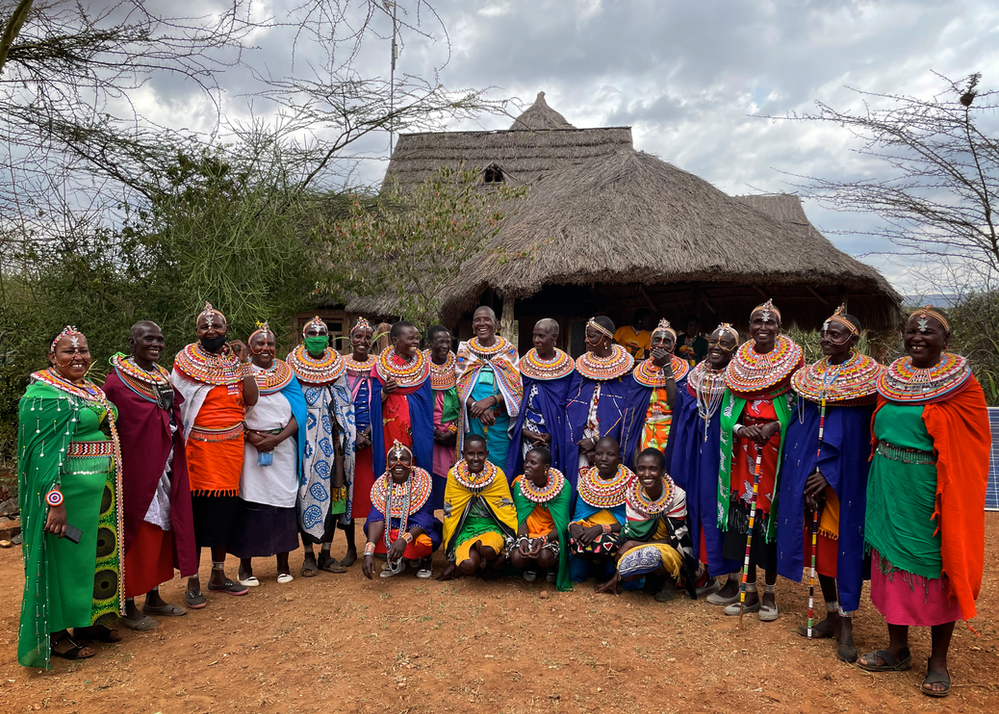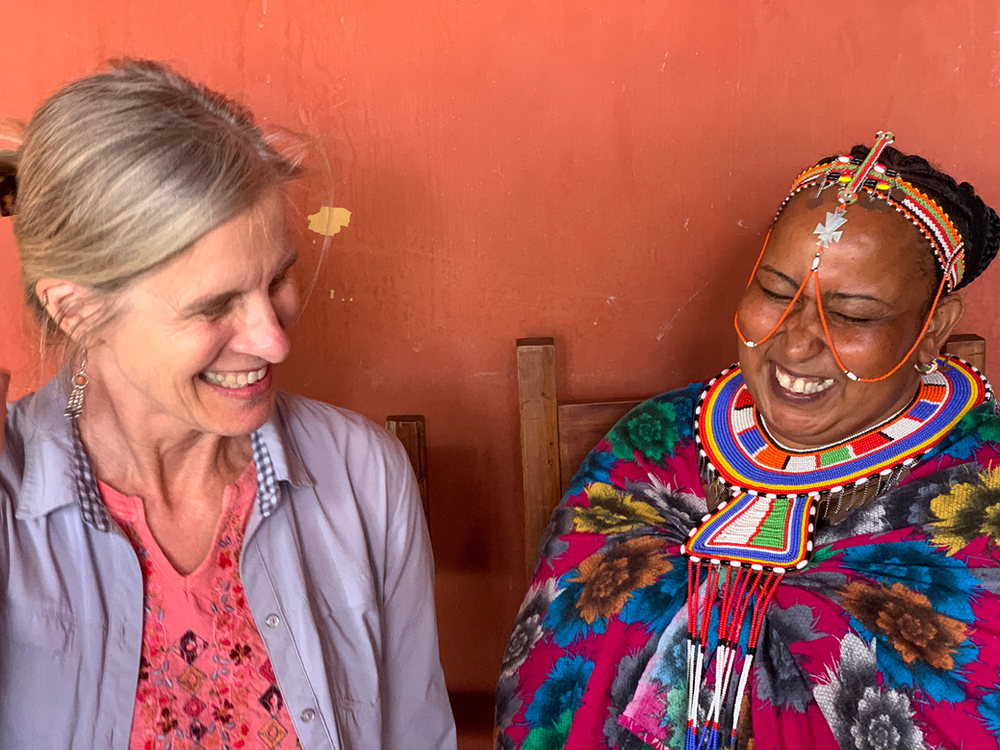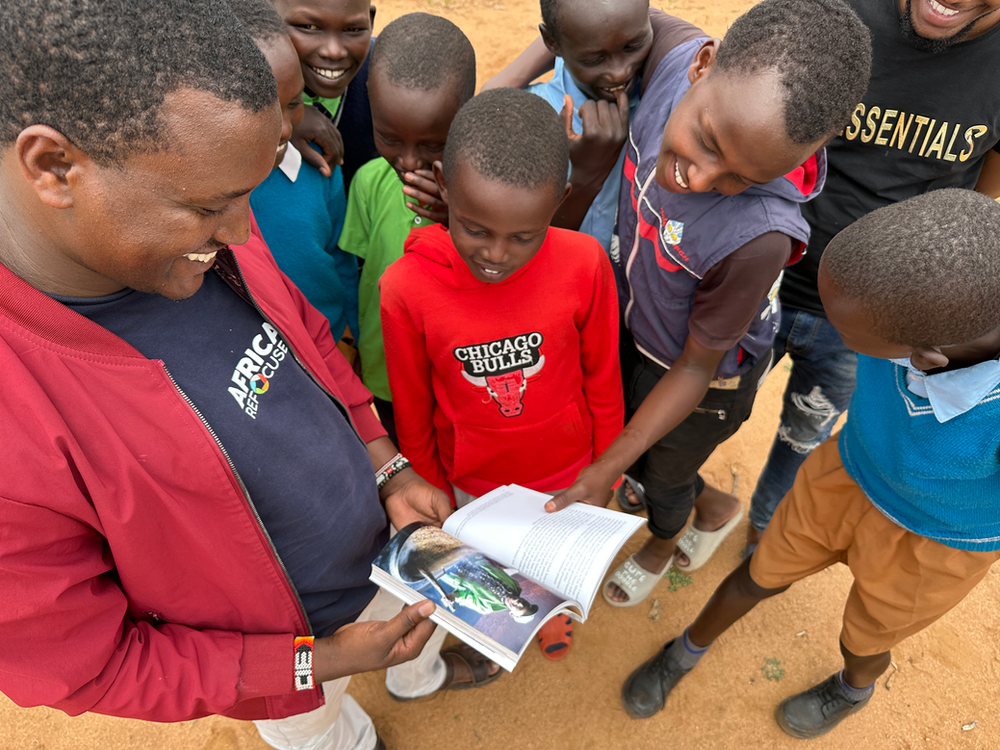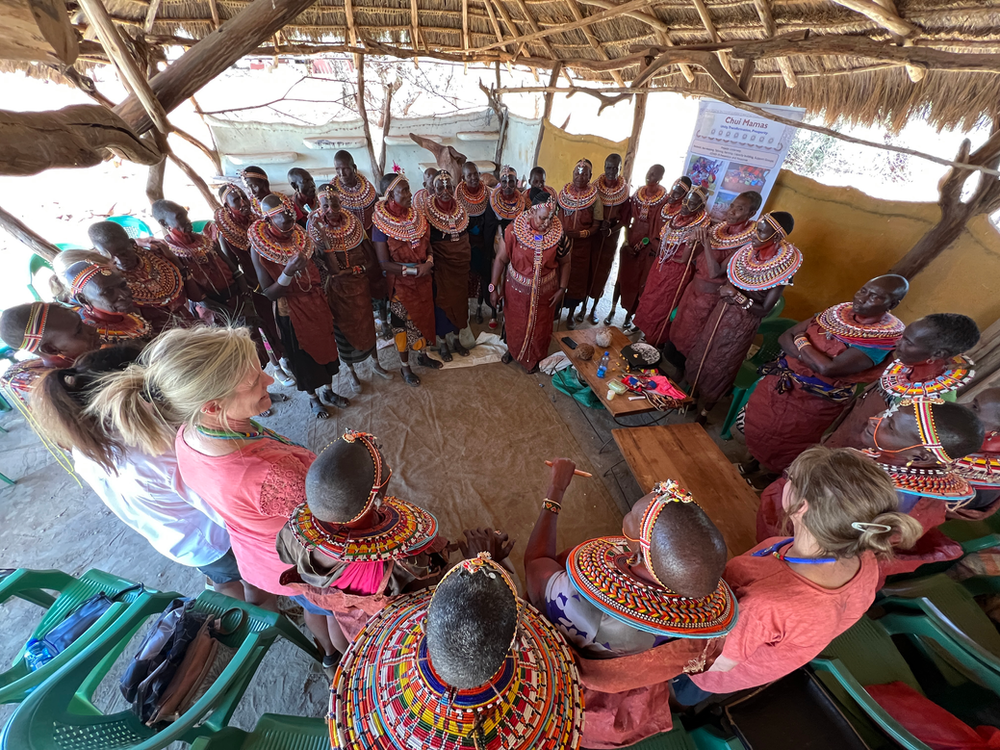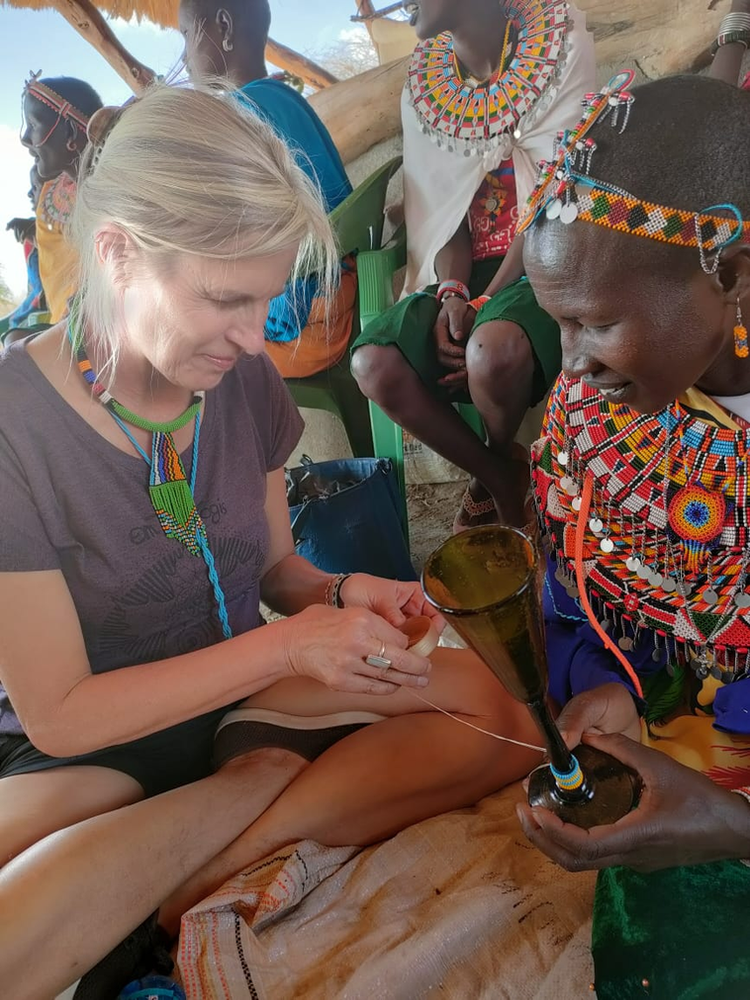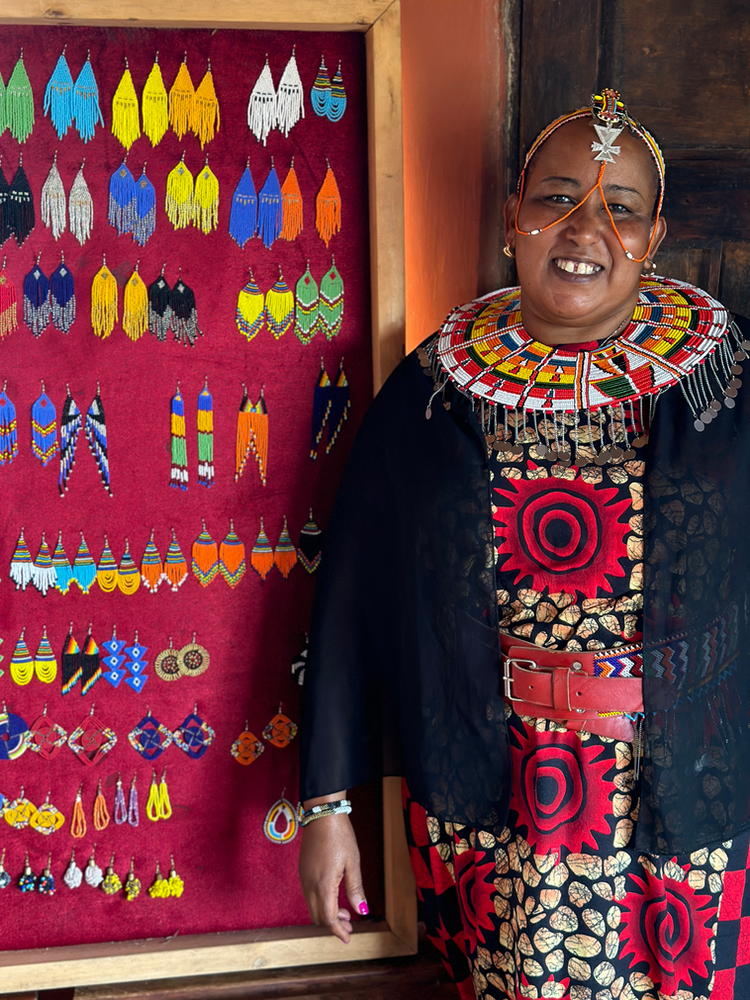In 2019, I had the opportunity to travel to Kenya for the first time. My partner, Chip Duncan, fell in love with the Maasai culture when he first visited in 2008. Since then, he has returned annually with small groups of travelers interested in experiencing an authentic safari experience with the added draw of spending time getting acquainted with the customs and personalities of Ewaso Village. As we landed on the dirt airstrip, I was eager to meet these amazing people, explore this new landscape and create my own memories and relationships.
We stay at a small Maasai owned lodge where the accommodations are comfortable but simple: an open-air flushing toilet, a shower with solar-heated water that’s usually warm by late afternoon, and a thatched roof that is often home to a local bird or bat family. Community members who have grown up on the savannah are our guides on safari and my favorite highlights are visiting the school, the clinic, and taking part in community activities. Each morning I create time to sit on the front porch of our hut held gently in meditation by the birds, the bees, and the butterflies. In a strange way, even on that first trip, Lewaso Lodge felt like home.
One day as the group was headed to a local homestead called a boma, I decided to stay behind. I felt the beginnings of a migraine and knew that a body scan and some time to “breathe and be” was the best choice for me that day. After an hour of meditation and rest, I found my way to the humble lobby of the lodge. Ellie, our community guide, and interpreter, was in deep conversation with another woman. They were obviously sharing something personal, and as I entered, both women became quiet. I smiled and picked up one of the beautiful, beaded necklaces that the Maasai women wear daily: broad flat collars adorned with beaded patterns in bright primary colors. I asked Ellie about the necklace and learned that a small group of local women had recently begun meeting at the lodge to bead and bond. Traditionally, the women work, day and night, at home. Many are isolated and exhausted. The idea of communing at the lodge was groundbreaking. I asked a few more questions and found out that when a young woman is married in the Maasai community, it is usually organized by their father in exchange for cattle. Once the marriage is complete, the woman becomes the property of her husband, and if they divorce, he dies, or even if he abandons her and their children, she has no rights, no assets, and no way to take care of herself or her children.
Ellie went on to describe her dream of creating a place for displaced women. Ellie’s story was all too common – she, too, had been abandoned as a young mother with two toddlers and had found support in the generous heart of a Catholic priest who supported her in receiving an education and getting a degree in tourism. While working at Lewaso Lodge, Ellie saw other women struggling to find their way, and she invited the widows to meet in a small enclosure with their beading projects. In the process, the women began sharing their life stories, hopes, and dreams.
That first year, I knew something important was happening, and I knew I wanted to help. In 2019, I left Ewaso Village with a bagful of beaded jewelry that I offered to try to sell back in Milwaukee. I became a member of the Loisaba Community Conservation Foundation (LCCF), a non-profit board based in New York State that supports food security, education, and enterprise in the Ewaso area. Through family and friends, I was able to raise about $1,000 for the women who beaded collectively. It felt amazing to give back to the local women and I wanted to learn more about them so I could help even more.
As Ellie’s dream unfolded, she expanded the invitation to divorced women, women with disabled children, women who had been sold into marriage at a very young age, women who wanted more of a voice in the family, women who were lonely. Basically, she opened the door to the beading hut and welcomed any woman who sat down and opened her heart.
Before long the group had decided on a name – the Chui Mamas! The black leopard (which is the same species as the black panther) had recently been rediscovered in Laikipia County by a young Maasai field biologist named Letuolai Ambrose. Black panthers often prey on livestock and have been exterminated in many areas of Kenya. Capturing the image of a blank panther on a camera baited with Chanel No. 5 indicated a return to balance for the wildlife population in the area. Leopard’s are fierce, strong members of the community that have been misunderstood – just like the women of Laikipia and Samburu counties. The word for leopard in Ma, the language of the Maasai, is “Chui” so the women voted for the name Chui Mamas to describe themselves. Ensuring the health of women in the community strengthens the entire community. The Chui Mamas are ambassadors of hope, balance, and love. Their motto, “Together we are always better” includes all women, men, children, and wildlife.
Over time, Ambrose (whose mother and grandmother are members of the women’s circle) has also undertaken a leading role in supporting the group through his connections with the San Diego Zoo, National Geographic, and Duncan Entertainment. Ambrose has created a group called the Wildlife Warriors in which he educates young boys about conservation of all beings. He is a vital cog in the community and his support of the Chui Mamas is essential in their intention to function as a true cooperative, unconditionally supporting each other and working together to educate the young, nurture the infirm, and provide opportunities for all.
The pandemic quashed our travel plans to return in 2020, but in 2022 my partner and I organized a small trip to Kenya, equipped with QR codes, vaccination cards, and Covid tests. Three of my dearest friends agreed to accompany us, with the goal of spending time with the newly expanded Chui Mamas group to learn more about their projects, challenges, and plans for the future. We danced together, sang together, prayed together and they even tried to teach us how to bead (which only made us all more appreciative of their beautiful creations).
On the last day of our visit, Marcia Thomas (Executive Director of USA for Africa) joined our group and asked the women, “What do the Chui Mamas need?” Their answers included food, water, and shelter, a voice in the community, and the ability to educate and protect our daughters. One woman named Seketo, stood up, looked me right in eye, and said, “We need ‘Mama Tina’ to sell our jewelry so we can be paid for our work and decide for ourselves the best way to take care of our families!”
Traditionally the women in the community do all the unpaid work: bearing, rearing, and raising children and carrying firewood and water each morning. Most work from dawn to dusk, without payment or recognition. So-called “women’s work” is an obligation for the women, with no payback. The idea of calling their group a “beading cooperative” started brewing in my mind and heart. Paying the Chui Mamas as a collective made sense to me. Of course, each woman knows best what her family wants and needs! Being paid gives women a voice in the decisions of the family each mother works day night to nourish and nurture.
I held Seketo’s challenge deep in my heart and was able to raise over $2,600 during 2023 through jewelry sales and donations. The money was used to buy supplies (beads, thread, and cloth for sewing projects), and, for the first time, funds were disbursed to pay each member of the cooperative directly in Kenyan schillings for their creativity, dedication, and hard work. Each Kenyan schilling held in their weathered hands represents a step toward a life where every woman can choose a partner, receive an education, and have hopes and dreams for herself and her family.
What began as a group of widows beading together at Lewaso Lodge has grown to include more than 600 women from 30 villages and surrounding communities – all eager to be seen, to be heard, and to claim their power.
Over the last few months, Ellie, Lisa Castagnozzi of Just Goods in Shorewood, Wi and myself, have been brainstorming new designs for Chui Mamas earrings as a way to separate their craft from the Maasai jewelry that is abundantly available on eBay and Etsy. These new designs and patterns represent a creative break from traditional colors and patterns and provide an opportunity to see their beadwork through a new lens.
When I arrived at Ewaso Village this year, I was thrilled to see the new styles displayed in the entryway to the lodge! They’re beautiful! I returned home in late April with 162 pairs of Chui Mama earrings in my suitcase. Our goal is to find sustainable markets to give the women a regular income source. We are working on a wholesale order with a fair-trade company and will also be selling the earrings outright on Instagram, Facebook, and at local markets.
Our first opportunity is Saturday, May 20 in Delafield from 12:00 – 5:00 PM at the DelaSpring Event. I’ll have a booth and be selling the earrings for $30. I’ll also start highlighting a few styles and colors on social media. Right now its under my name (Tina Langdok on FB) or my studio (trilliumstudiomke on Instagram). Lisa is working on branding their work and creating new FB and Instagram pages dedicated to Chui Mama Beadwork. You can also contact me at the Chui Mamas new email: thechuimamas@gmail.com to order earrings and make donations.
Each purchase – along with your generous donations – will support the future that Seketo saw so clearly last year and expressed so bravely in her challenge. Yes.
Together we are always better, and when women support women,
the world is a better place.
To learn more about Ewaso Village, pick up a copy of Chip Duncan’s new book, Ewaso Village: Poems and Stories from Laikipia County, Kenya. (amazon.com/Ewaso-Village-Stories-Laikipia-County/dp/1590795202)
